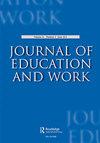Competence importance and acquisition: comparing qualified and non-qualified vocational teachers
IF 1.7
Q2 EDUCATION & EDUCATIONAL RESEARCH
引用次数: 1
Abstract
ABSTRACT Experiencing a teacher shortage, Sweden has allowed vocational teachers to gain employment without teaching qualifications. In this context, a population of non-qualified vocational teachers has emerged, a group of people rarely captured by national statistics and previous research. This study aims to shed light on the profile of non-qualified vocational teachers. By highlighting the potential differences between qualified and non-qualified teachers, with reference to competence, this study identifies competence they perceive as important (importance scale), as well as competence they think they have developed during their work (achievement scale). The data collection was realised with a questionnaire, focusing on a 27-item competence set that teachers evaluated. According to findings and concerning importance, statistically significant differences were found for nine items, with the majority of them being direct learning outcomes of formal teacher education. Regarding achieved competence, statistically significant differences were reported for 17 items. Non-qualified teachers evaluated these items lower than qualified ones, showing that they perceive these competencies as underdeveloped. In conclusion, non-qualified vocational teachers expressed underdeveloped competence in comparison to qualified, which can have implications in the formation of their teacher identity and the values they promote to their students.胜任力的重要性与获取:比较合格与不合格的职业教师
由于教师短缺,瑞典允许没有教学资格的职业教师就业。在这种背景下,出现了一群不合格的职业教师,这群人很少被国家统计数据和以前的研究所涵盖。本研究旨在揭示非合格职业教师的概况。通过强调合格教师和不合格教师在能力方面的潜在差异,本研究确定了他们认为重要的能力(重要性量表),以及他们认为自己在工作中发展的能力(成就量表)。数据收集是通过问卷调查实现的,重点是教师评估的27项能力集。根据调查结果和重要性,有9个项目存在统计学显著差异,其中大多数是正规教师教育的直接学习成果。在达到的能力方面,有17个项目报告了统计学上显著的差异。不合格的教师对这些项目的评价低于合格的教师,表明他们认为这些能力不发达。总之,与合格的职业教师相比,不合格的职业教师表现出不发达的能力,这可能会影响他们教师身份的形成以及他们向学生推广的价值观。
本文章由计算机程序翻译,如有差异,请以英文原文为准。
求助全文
约1分钟内获得全文
求助全文
来源期刊

Journal of Education and Work
EDUCATION & EDUCATIONAL RESEARCH-
CiteScore
2.70
自引率
14.30%
发文量
40
期刊介绍:
The Journal of Education and Work is an international forum for academic research and policy analysis which focuses on the interplay of the education and economic systems. The journal examines how knowledge, skills, values and attitudes both about and for work and employment are developed within the education system. The journal also explores the various forms of industrial training and accreditation in the economic system, including changes in the economic and industrial infrastructure which influence the type of employees required. Work in the informal economy is also included.
 求助内容:
求助内容: 应助结果提醒方式:
应助结果提醒方式:


